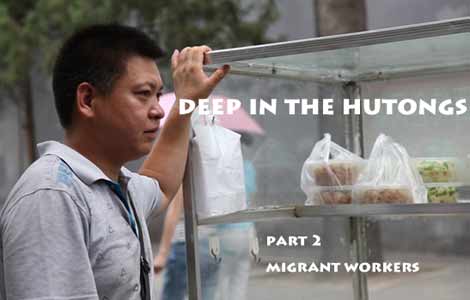Measuring up to Mr Sai
Updated: 2013-10-11 09:55
By Lao Huang and Liu Jue (China Daily)
|
|||||||||||
A character for the scientist in all of us 包罗万象的科学, 你中意的是哪一科?
In 1915 in Switzerland, as Albert Einstein forever changed our understanding of gravity, time and space with his General Theory of Relativity, across the world a group of young advocates strove to introduce the very concept of science to the general public in post-revolutionary China. "Mr Sai"
(赛先生) and "Mr De" (德先生) were sensational figures at the time - two foreign gentlemen bringing a brighter future to an ancient country, according to their leader, Chen Duxiu (陈独秀). Of course, they weren't really foreign experts. To effectively engage the public and explain the otherwise abstract ideas of the scientific method, Chen borrowed from the pronunciations of "science" and "democracy", giving them human form in a massive promotional campaign. "Only Mr De and Mr Sai can save China," Chen wrote.
At the time, a competing term for science, 科学 (kēxué), ultimately won the usage battle. The 科 in 科学 has a very long history. You can even find it in a 2,000-year old dictionary from the Han Dynasty (206 BC-AD 220), Explaining and Analyzing Characters (《说文解字》Shuōwén Jiězì). But it was not until the first decade of the 20th century that the character began to be associated with science.
The word choice was actually borrowed from the Japanese, who adapted earlier to Western sciences. Literally meaning "the study of disciplines", 科学 may not be the perfect embodiment of what science really is. On the left is the character 禾 (hé), meaning "grain"; on the right is 斗 (dǒu), a container for measurement. Together, it means "measuring the grain to decide its quality and class".
In ancient China, the imperial exam, or 科举 (kējǔ), was the only way to move up the social ladder if you were born lower class. The exam was comprised of different subjects, thus the use of 科. Such a critical event has given birth to many other terms. For instance, 科场 (kēchǎng) was the venue in which the exam took place. For today's college entrance exam takers, its modern equivalent is 考场 (kǎochǎng).
文科 (wénkē) means to rack your brains, but 科 can also be made to mean a competition of fighting skill, or 武科 (wǔkē). Nowadays, students choose between 文科, now meaning "liberal arts", and 理科 (lǐkē), or "natural science".
Once they passed the final exam, the ancient examinees would face a far more promising prospect than their modern counterparts. 五子登科 (wǔzǐ dēngkē) is actually a wish, a hope that all five of the family's sons will pass the imperial examination.
Today, 科 appears in a number of terms meaning science, including light-hearted 科普 (kēpǔ) or "popular science", 科幻 (kēhuàn) meaning "sci-fi", 科研 (kēyán) or "scientific research", and the inclusive 科技 (kējì) meaning "science and technology". Scientists are 科学家 (kēxuéjiā), and an institute for scientific research is a 科学院 (kēxuéyuàn).
Apart from science, 科 is still connected to categories and organizations. In administrative organizations, 科 refers to a relatively small unit, such as 财务科 (cáiwùkē) meaning "finance section". The unit chief is called 科长 (kēzhǎng). In the hospital, 科 means "department". For instance, the department of pediatrics is 儿科 (érkē); dental department is 牙科 (yákē) and neurology is 神经科 (shénjīngkē). In biology, 科 means "family" in the classification of organisms and phytocoenoses. Believe it or not, biology in Chinese might actually be easier than their Latin-based binomial counterparts. Felidae, for example, is 猫科 (māokē) meaning "the family of cats"; Homo sapiens are 人科 (rénkē) meaning "the family of humans" and Solanaceae is 茄科 (qiékē) meaning "the family of eggplants".
On other occasions, 科 is associated with laws and regulations. In ancient times legal texts were typically divided in to different sections. A fancy way to say "commit crimes and break the law" is 作奸犯科 (zuò jiān fàn kē), and criminal record is 前科 (qiánkē).
Perhaps 百科全书 (bǎikē quánshū) best reflects the meaning of 科 - "the book of hundreds of subjects" meaning encyclopedia.
Courtesy of The World of Chinese, www.theworldofchinese.com
The World of Chinese
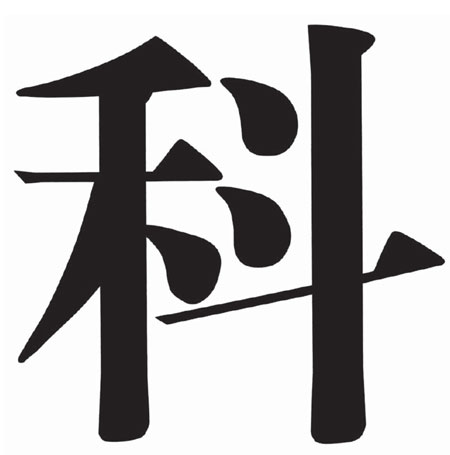
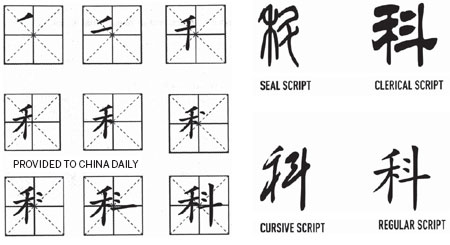
(China Daily European Weekly 10/11/2013 page27)
Today's Top News
Senate leader 'confident' fiscal crisis can be averted
Riding the wave of buy-ups
Working group to discuss sea issues
Chinese firm joins UK airport enterprise
Disaster response gets a helping hand
Have yuan, will travel far and wide
Draft regulation raises fines for polluters
Communities give care for elderly
Hot Topics
Lunar probe , China growth forecasts, Emission rules get tougher, China seen through 'colored lens', International board,
Editor's Picks

|

|
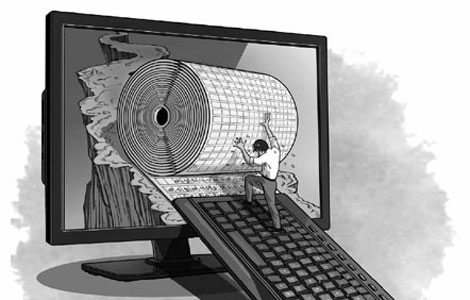
|

|
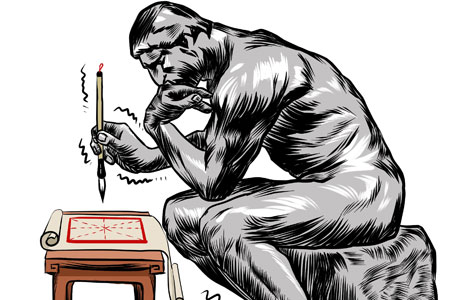
|

|

